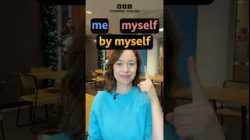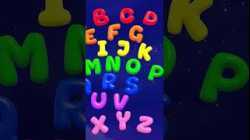
Why you should make mistakes, and how to learn from them สาธารณะ
ประเภท:
ลักษณะ:
Are you embarrassed or frustrated when you make mistakes? You are not alone. Many learners feel bad when they make a mistake, but they dont realize that making mistakes can help them improve! In fact, making mistakes is one of the BEST WAYS TO LEARN, especially if you are trying to learn a language. In this video, I will teach you that making mistakes is a very important part of learning a language. I will then show you some ways you can use your mistakes to improve your English. We will go through some practical tips on what you should do to maximize your learning. Which mistakes should you focus on? How do you know what your mistakes are? How can you make sure that you are improving? For answers to these questions and more, watch the video.
Now its time to watch another video! Watch this video about how to stop wasting time and start learning:
https://www.youtube.com/watch?v=REJNBGEAQRo&list=PLaNNx1k0ao1u-x_nKdKNh7cKALzelzXjY&index=11&t=0s
Take the quiz on this lesson: https://www.engvid.com/why-you-should-make-mistakes/
TRANSCRIPT
Hello. My name is Emma, and in todays video we are going to talk about mistakes and why we should make them, and: What should we do when we make them? Okay? So, I hope youre making mistakes; very, very important when youre learning anything. Whether its math, science, English, French, Spanish, Chinese - you want to make mistakes. Okay? I cannot say that enough. If youre not making mistakes, then youre doing something wrong because if youre making mistakes it means youre actually using the language or, you know, youre actually... Its very important in the learning process to make mistakes. So, in this video Im going to teach you six ways or six steps on how to improve with mistakes. Okay?
So, before I get started, I just wanted to again say: Please, please, please make mistakes, especially when youre learning a language because mistakes equal good learning. Okay? So, I... You know, I know a lot of students when they go out and theyre talking to a native speaker, they feel so embarrassed. "Oh my goodness, I just... I cant believe I just said that. I made a mistake with the present perfect. Oh my god", its not a big deal, you should be making these mistakes.
So, the first step on how to learn from your mistakes is: Give yourself permission to make mistakes. Okay? You want to tell yourself its okay, and I cant stress this enough. Tell yourself: "I need to make mistakes. Today Im going to try make mistakes.", "Another mistake? Yay me. Woo! Very good." Okay? So give yourself permission. Dont look at mistakes as a bad thing because they are not a bad thing. Mistakes, when learning a language, are actually a good thing.
So, step two: Once you give yourself permission to make mistakes, you should start to know your mistakes. Okay? What are the mistakes youre making? So one way you can find out what mistakes youre making is you can ask your teacher, or your friend, or, you know, somebody youre close to, maybe your classmate. You can ask them: "Whats my biggest mistake? When I speak English, whats my biggest mistake? In my writing, whats my biggest mistake?" Okay? So a lot of the times other people can help and tell you what your biggest mistake is.
Another thing you should be asking: "Why is it a mistake? What is the problem with this? Why is it a mistake?" Okay? A lot of the times with students Ive found, and Im also guilty of this, I remember in university I would write an essay and I would get all these comments on my essay and Id also get a mark or a grade, you know, like A+, B, whatever. And I remember always looking just at the percent I got or the grade, and not looking at the comments. Those comments that your teachers write actually tell you a lot about the mistakes youre making, so please, please, please see that, read it, focus on it, and think about it. Okay? Whatever your teacher writes on your essay, on your test, take a moment to really think about that mistake.
Also, another way to know what mistakes youre making is you can think about what mistakes are common for people speaking your language. So, for example, if a Spanish person is learning English, maybe they say: "I am agree", which is fine in Spanish, but in English its a mistake; or maybe if youre Brazilian, you want to say the word "red" but you say the word "head" because the R sound and the H sound, I think, you know, with Brazilian students this is often a pronunciation mistake. So think about: What mistakes are common for your culture? We have a lot of resources on this on engVid actually, where you can actually see common mistakes for your language. Okay.
Im going to get into this in a moment with the next step, but Ill just say it right now because I really want you to think about this: When you ask somebody: "What is my biggest mistake?", try to focus on one mistake. […]
Now its time to watch another video! Watch this video about how to stop wasting time and start learning:
https://www.youtube.com/watch?v=REJNBGEAQRo&list=PLaNNx1k0ao1u-x_nKdKNh7cKALzelzXjY&index=11&t=0s
Take the quiz on this lesson: https://www.engvid.com/why-you-should-make-mistakes/
TRANSCRIPT
Hello. My name is Emma, and in todays video we are going to talk about mistakes and why we should make them, and: What should we do when we make them? Okay? So, I hope youre making mistakes; very, very important when youre learning anything. Whether its math, science, English, French, Spanish, Chinese - you want to make mistakes. Okay? I cannot say that enough. If youre not making mistakes, then youre doing something wrong because if youre making mistakes it means youre actually using the language or, you know, youre actually... Its very important in the learning process to make mistakes. So, in this video Im going to teach you six ways or six steps on how to improve with mistakes. Okay?
So, before I get started, I just wanted to again say: Please, please, please make mistakes, especially when youre learning a language because mistakes equal good learning. Okay? So, I... You know, I know a lot of students when they go out and theyre talking to a native speaker, they feel so embarrassed. "Oh my goodness, I just... I cant believe I just said that. I made a mistake with the present perfect. Oh my god", its not a big deal, you should be making these mistakes.
So, the first step on how to learn from your mistakes is: Give yourself permission to make mistakes. Okay? You want to tell yourself its okay, and I cant stress this enough. Tell yourself: "I need to make mistakes. Today Im going to try make mistakes.", "Another mistake? Yay me. Woo! Very good." Okay? So give yourself permission. Dont look at mistakes as a bad thing because they are not a bad thing. Mistakes, when learning a language, are actually a good thing.
So, step two: Once you give yourself permission to make mistakes, you should start to know your mistakes. Okay? What are the mistakes youre making? So one way you can find out what mistakes youre making is you can ask your teacher, or your friend, or, you know, somebody youre close to, maybe your classmate. You can ask them: "Whats my biggest mistake? When I speak English, whats my biggest mistake? In my writing, whats my biggest mistake?" Okay? So a lot of the times other people can help and tell you what your biggest mistake is.
Another thing you should be asking: "Why is it a mistake? What is the problem with this? Why is it a mistake?" Okay? A lot of the times with students Ive found, and Im also guilty of this, I remember in university I would write an essay and I would get all these comments on my essay and Id also get a mark or a grade, you know, like A+, B, whatever. And I remember always looking just at the percent I got or the grade, and not looking at the comments. Those comments that your teachers write actually tell you a lot about the mistakes youre making, so please, please, please see that, read it, focus on it, and think about it. Okay? Whatever your teacher writes on your essay, on your test, take a moment to really think about that mistake.
Also, another way to know what mistakes youre making is you can think about what mistakes are common for people speaking your language. So, for example, if a Spanish person is learning English, maybe they say: "I am agree", which is fine in Spanish, but in English its a mistake; or maybe if youre Brazilian, you want to say the word "red" but you say the word "head" because the R sound and the H sound, I think, you know, with Brazilian students this is often a pronunciation mistake. So think about: What mistakes are common for your culture? We have a lot of resources on this on engVid actually, where you can actually see common mistakes for your language. Okay.
Im going to get into this in a moment with the next step, but Ill just say it right now because I really want you to think about this: When you ask somebody: "What is my biggest mistake?", try to focus on one mistake. […]
ต่อไป
เล่นอัตโนมัติ











6 yปี